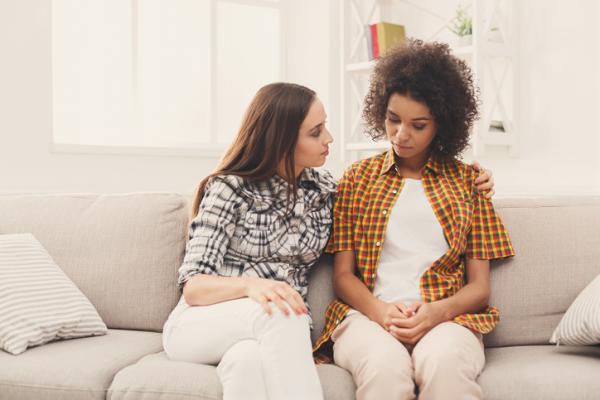The breakup of a romantic relationship can be one of the most difficult emotional experiences we face in life. Regardless of the length of the relationship or the circumstances surrounding it, the end of a loving bond can cause a grieving process in which they may feel sadness, confusion, despair, anxiety or anger. Among these emotions, it is common to experience some “emotional low.” Among the causes of depression after a breakup are the loss of a significant emotional bond, the grieving process, changes in routine and identity, fear of the future and loneliness, and the impact on self-esteem. Understanding these emotions is essential to effectively face this transition period and build a solid foundation to overcome emotional depression.
In this PsychologyFor article, we will provide 10 practical tips to get over the lows after a breakup and move towards improvement and towards an emotionally healthier life.
Feel and accept your emotions
Allowing yourself to feel and accept the emotions after a breakup is an essential step in overcoming a breakup. It is normal to experience a wide variety of feelings during this stage, from sadness to anger or confusion. For this reason, you should not feel guilty about these emotions, as they are a natural part of the recovery process.
Grant to yourself time and space needed to process what you feel and don’t rush to feel good right away. Each person has their own pace of healing, and it is important to be kind and compassionate to yourself as you go through this emotional roller coaster.
Seek support
Establishing a support network is another fundamental aspect of coping with emotional downturns after a breakup, so don’t try to face this process alone and don’t hesitate to seek the necessary support to take care of yourself during this stage. Seek support from close friends, family, or even a mental health professional.
Share your feelings and thoughts It will give you a sense of understanding and empathy, and allow you to receive advice and comfort from people who care about your well-being. Emotional support will help you feel accompanied on this difficult path and will provide you with tools to face emotional challenges with greater strength and clarity.
Practice self-care
During this recovery period, It is essential that you focus on self-care Spend time doing activities that fill you with joy and well-being, such as exercising, meditating, reading a book, or enjoying your favorite hobby. By paying attention to your physical and emotional well-being, you can nourish your inner strength and find emotional balance.
Taking care of yourself will allow you to regain energy and strengthen yourself to face the challenges that come with overcoming a breakup. Remember that self-care is an act of self-love and a powerful tool to heal and rebuild yourself emotionally.

Avoid contact with your ex
To overcome the downs after a breakup, it is crucial to avoid contact with your ex. In fact, resist the temptation to seek or maintain communication It will allow you to advance in the healing process. You can use zero contact if possible, eliminating contact on social networks and avoiding personal encounters, at least for a while.
By allowing yourself to disconnect, you can focus on your own personal growth and spend time taking care of yourself. This separation will help you process your emotions more effectively and give you the opportunity to rediscover your identity outside of the previous relationship.
Focus on your future
Focusing on your future and setting goals is powerful advice for overcoming the lows after a breakup. Looking forward will allow you redirect your thoughts towards the positive aspects of your life Setting new goals will give you a sense of purpose and motivation to keep going.
Focus on your aspirations and the opportunities that lie before you. Visualize what you want to achieve and work on achieving those goals step by step. By focusing on the future, you will be able to build a new perspective and turn this difficult period into an opportunity for your personal growth and development.
Learn from what happened
Learning from the breakup experience is a valuable opportunity to grow and develop emotionally. Reflect on the positive and negative aspects of the relationship, identifies behavioral patterns and draw lessons from past experiences. This introspection will allow you to better understand your needs and limitations in a relationship.
By learning from mistakes and successes, you will be better prepared to establish healthier relationships in the future. Take advantage of this stage of reflection to strengthen your self-knowledge and personal growth, turning the breakup into an opportunity to build a more emotionally enriching life. Here we explain how to break mental patterns.
Do not isolate yourself
Despite feeling the need to isolate yourself after the breakup, it is crucial not to distance yourself from others. Maintaining an active social life can be beneficial for your emotional well-being. Go out with friends or create new groups and activities Relating to others will provide you with distraction and help you feel connected to others, avoiding the feeling of loneliness.
Sharing moments with people who support and understand you can provide you with comfort and different perspectives. Do not close yourself off to the possibility of new friendships, since social support can be a fundamental pillar in your improvement process.

Do not blame yourself
Avoiding blaming yourself is essential to overcome emotional downturns after a breakup. In these cases, it is common to fall into self-criticism and blame, but remember that a relationship involves the participation of two people and the responsibilities are not exclusively yours.
Accept that each of you has your share of responsibility in the dynamics of the relationship and don’t punish yourself excessively Because of what happened, instead, learn from the experience and approach it as an opportunity to grow and improve.
Learn to forgive
Learning to forgive is key to overcoming emotional lows after a breakup and leaving the past behind. Forgiving your ex, and especially forgiving yourself, is a liberating step in this process. Forgiveness frees you from emotional burden and allows you to move forward more easily.
By forgiving you let go of anger and resentment, which gives you the opportunity to heal and move on with your life. Remember that forgiveness does not mean forgetting, but rather letting go of the emotional weight that prevents you from moving towards a life of recovery.
Be patient with yourself
Finally, being patient with yourself is key to getting over a breakup. Recovering after a breakup takes time and effort, so don’t be discouraged if you don’t feel better right away. Each person has their own rhythm of recovery and it is important to respect that process.
Give yourself the love and understanding you deserve during this time of personal growth and be kind to yourself and allow the emotions to flow without judging yourself. With time and self-care you will feel stronger and prepared to face what the future holds for you with optimism and strength.
This article is merely informative, at PsychologyFor we do not have the power to make a diagnosis or recommend a treatment. We invite you to go to a psychologist to treat your particular case.
If you want to read more articles similar to How to get over the lows after a breakup we recommend that you enter our Feelings category.
Bibliography
- Páez, D., Bilbao, MA, and Javaloy, F. (2008). From trauma to happiness: Extreme negative events can generate positive beliefs and personal growth. Internships in Positive Psychology. https://www.ehu.eus/documents/1463215/1504275/P%e2%80%a0ez-Bilbao+y+Javaloy+(2008).pdf
- Valdivia, F., and Pinto, B. (2020). Structural approach and problem-focused therapy applied to love breakup. Ajayu Scientific Dissemination Body of the Department of Psychology UCBSP, 18(1), 244-270. http://www.scielo.org.bo/pdf/rap/v18n1/v18n1_a10.pdf








